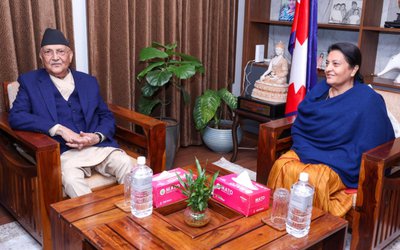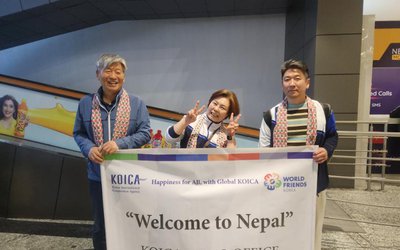
As Nepal government's annual investment in scientific research is declining, nobel laureate Prof Dan Shechtman suggested that Nepal could motivate the country’s younger generation to establish new technological ventures.
“Technological entrepreneurship was a key to the world peace and prosperity,” said Professor Dan Shechtman, speaking at a talk program organised on the sidelines of the 13th International Conference on Quasicrystals (ICQ13) in Kathmandu.
Professor Dan Shechtman,who won the Nobel prize for Chemistry in 2011 for the discovery of quasicrystals, argued that technological entrepreneurship was possible only after putting the real science education in nation’s top priority list.
“Nepal can inspire engineers, scientists, medical doctors and computer experts, among others, for the technological startups,” said Israeli scientist. He prescribed various venture capital funds for the startups.
“Good basic education to all as well as good engineering and science education, supportive government policy, free market economy and corruption-free society were the basic elements that always helped empowering the entrepreneurship,” said Prof Shechtman.
“Unstable economies and population growth as well as urbanization and education to women are the major challenges to technological revolution,” said the professor of material science at Technion, a public research university in Haifa, Israel.
He said that innovation which leads to entrepreneurship is mainly concerned with the national democracy, social equality and lack of fear from authority.
Prof Shechtman also highlighted that there was a challenge for every nation to make school-going children like science. “A real science education is the need of the hour,” he said.
“The trend of population growth moved from expanding to stationary, the scientists said that there was also challenge to manage an ageing population when the age-wise trend reached to a stage of contracting,” said professor Shechtman.
Shechtman who discovered quasiperiodic crystals in April 1982 as a visiting scholar at the National Bureau of Standards in Maryland, US, has won the Nobel Prize in Chemistry in 2011.
“Nepal could learn from Israel that how technological entrepreneurship could overcome all challenges hindering the nation’s peace and prosperity. Shechtman is a role model in Israel and in the world,” said Ambassador of Israel to Nepal Yaron Mayer. Ambassador Mayer said that Nepal can learn from Israeli scientist Shechtman.
At a program jointly organized by the Embassy of Israel in Nepal, Non-Resident Nepali Association and Nepal Science Foundation Trust in support with Nepal Forum of Science Journalists and Asian Science Camp Alumni Association, professor Prof Dan Shechtman interacted with Nepalese younger generation.
Israel Mourns Passing Of Peres
Former Israeli President and Prime Minister Shimon Peres died at the age of 93 o 28 September 2016.
Peres served as the Ninth President of Israel from 2007 to 2014, twice as the Prime Minister, between 1984-1986 and 1995-1996, and as Foreign Minister from 2001 to 2002. He is a Nobel laureate, having won the Nobel Peace Prize, 1994 (which he shared with Yitzhak Rabin and Yasser Arafat for the Oslo Accords). Peres played a key role in the peace process in the Middle East.
Peres was the last in the generation of Israel's founding fathers, and played various political key roles from the establishment of the country, and throughout his whole life.
He is survived by three children, eight grandchildren and two great grandchildren.
- UML POLITCIS: Oli Vs Bhandari
- Apr 29, 2025
- FORMER KING GYANENDRA: Bating Constituional Monarchy
- Apr 28, 2025
- NC-UML COALITION: In Turmoil
- Apr 27, 2025
- TEACHERS ON STRIKE: Students' Future In Jeopardy
- Apr 25, 2025
- NEPAL-THAILAND: Joint Business Council
- Apr 13, 2025















